Renaissance Voices Celebrate Epiphany
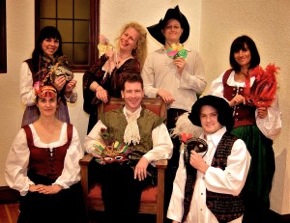
A classical concert followed by "a feast of roast pork pie, king's cake and wassail" (a kind of English sangria or hot mulled cider) is a rare happening. But that's what the pioneering San Francisco Renaissance Voices offers as its celebration of the Boar's Head Festival, on Jan. 15 in San Francisco and Jan. 16 in Palo Alto. They are just 10 days late after an important but ( at least in the U.S.) seldom celebrated holiday.
The feast is the British way of marking Twelfth Night, "the evening of the fifth of January, preceding Twelfth Day, or Epiphany," bringing the Christmas period to an end, and the proper time for getting rid of those poor trees. The Boar's Head Feast precedes Christianity, going back to ancient times when the boar was sovereign of the forest.
Hunted as a public enemy, the shark of the land, boar was the first dish served at banquets. As Christian beliefs overtook pagan customs, the presentation of a boar's head at Christmas, beginning in the 14th century, came to symbolize the triumph of virtue over sin. (Just to clarify: The feast portion of this concert will settle for roast pork; no boar is to be served.)
Besides the historical-religious background, the Twelfth Night event also has a practical consideration. Conductor and Assistant Music Director Katherine McKee says "the opportunity for us to introduce a 650-year-old tradition here is also handy for those too busy in December. Now you can enjoy performances featuring traditional holiday music, apart from the hectic pace of last month."

Renaissance Voices is known for its a cappella choral performances of 15th- and 16th-century music, especially lesser-known and rarely performed works, but the group also explores the music of other periods and music outside traditional European literature.
For this concert, the program consists of English music, ranging from traditional songs through contemporary classical, from Thomas Tallis (1505-1585) to Benjamin Britten (1913- 1976), and Bay Area composer Alva Henderson.
Thirteen of the Renaissance Voices will join guest soprano Susan Gundunas, known for her Phantom of the Opera appearances. The audience is expected to sing along to "The Boar's Head Carol" after scenes from Shakespeare's Twelfth Night.
The production also features local actors Antonio San Toro and Paul Dana, with Gabrielle Motarjemi as Queen Elizabeth I.
Todd Jolly is music director of the organization. The singers are sopranos Katie Bank, Rita Lilly, Lisa May, and Diana Pray; altos/countertenors David Alban, Paula Chacon, Katherine McKee, and Jane Reider; tenors Jesse Buddington, Nicholas Kotar, Emil Martinsek, and Samuel Palmer; and basses/baritones J. Jeff Badger, Jeff Fields, Raymond Martinez, and Bill Treddway.
Back to the food and history: "King's cake" is a brioche-type cake, baked in a round shape to represent the circular route taken by the Three Kings to confuse King Herod who was trying to follow the wise men so he could kill the Christ Child.
Joyful Start for Philharmonia's New Recording Label
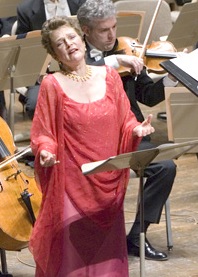 There are few more beloved singers here and around the world than the late Lorraine Hunt Lieberson, and Nicholas McGegan's Philharmonia Baroque Orchestra will make those fans very happy.
There are few more beloved singers here and around the world than the late Lorraine Hunt Lieberson, and Nicholas McGegan's Philharmonia Baroque Orchestra will make those fans very happy.
To mark the orchestra's 30th anniversary, the ensemble is launching its own recording label. The first release, on March 8, will showcase performances of the great mezzo.
Included are the live 1995 recording of Berlioz's Les Nuits d’été and a live 1991 recording of arias from Handel's Giulio Cesare, Ottone, Arianna, Radamisto, and Agrippina.
The Berlioz is the last of seven acclaimed recordings she made with the orchestra and the first time she ever sang the full Berlioz song cycle in performance. McGegan recalls the experience:
There are certain musical performances you always remember, and I can remember exactly what it felt like standing there next to her for the Berlioz. It was thrilling. You don't forget that. Her artistry shines through on this recording.”
Philharmonia Baroque Productions will release three recordings this year. In April, it's Haydn symphonies performed in concert over the last several years; the plan for September is an all-Vivaldi disc, featuring violinist Elizabeth Blumenstock.
All recordings are engineered and produced by David R. Bowles, a former cellist with Philharmonia Baroque who began producing records in 1996. Bowles has a degree from the Juilliard School and played with Philharmonia Baroque for several years. After an injury forced him to stop playing, he moved to recording and, to date, has engineered more than 60 projects for commercial release for a variety of ensembles.
What Time the Concert?
In Europe, concerts usually start at 7 p.m. or 7:30 p.m. Sunday's S.F. Performances recital (see next item) started at 5 p.m. (hurrah!), but the same organization's outstanding Saturday string quartet series begins at the ungodly hour of 10. In the morning.
started at 5 p.m. (hurrah!), but the same organization's outstanding Saturday string quartet series begins at the ungodly hour of 10. In the morning.
Otherwise, through the land, the rule is 8 o'clock for regular evening performances, 2 p.m. for matinees. There are quite a few of us regular concertgoers who think 8 — meaning the end won’t come till after 10 p.m. — is too late, especially for operas that run four to five hours.
San Francisco Symphony started a delightful experiment a few years back with a 6:30 p.m. Friday starting time. What was called "6.5" in a quake-prone area has now dropped its other innovation — of a lecture-performance structure — but kept the early hour.
And now, in this season, SFS has added more 2 p.m. Thursday matinees, so that those performances, along with the traditional 8 p.m. Wednesday program premieres and the 2 p.m. Sunday matinees, will have 12 instances each.
While varying starting times may be hard on the orchestra's planning and logistics, I think that for audiences it's a great plus to have flexibility of selection. Maybe the future will bring even more choices.
Soyeon Lee Recital Debut
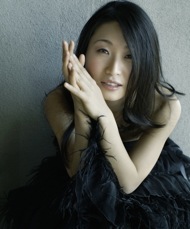
Herbst Theatre, filled to near capacity, was the setting Sunday afternoon for the San Francisco Performances debut of pianist Soyeon Lee, winner of the 2010 Naumburg Award. It was a bold, winning recital, similar in its programming and all-around excellence to Yuja Wang's concerts. Lee has almost a decade over Wang (she’s 31 versus 23), but still qualifies as "young talent," though her artistry is completely mature and fully formed.
Lee's superb calling card was Bach's French Suite No. 5 in G Major, in a stunning performance. Both "cool" and warm, but without a smidgen of sentimentality, this was a wonderfully fluent and flawlessly integrated piece.
The pianist handled the tricky transitions between the seven varied movements, from stately to rhythmic, broadly singing to starkly dramatic. Tempos and dynamics changed effortlessly, and were always exactly right, Allemande and Courante, Sarabande and Gavotte receiving their just due. Bach doesn't allow emoting, but the emotions in the work must be expressed, and Lee was more than equal to the challenge. The one questionable decision: The concluding Gigue sounded overbright and a bit noisy.
From the sharp staccatos of Unsuk Chin's strange, difficult-to-like Etude No. 6 (Grains), Lee launched almost without pause into Ligeti's Etude No. 6 (Autumn in Warsaw), and here once again, Wang came to mind as both pianists handle Ligeti with equal aplomb and brilliance.
Wang came to mind once more with Lee's powerful and effortlessly fluent interpretation of Shostakovich's Prelude and Fugue No. 15 in D-flat Major, and she performed the Ravel La valse with appealing and restrained drama, leading to the explosion at the end. The second half of Lee's varied and generous program offered Schumann's Carnaval, along with a Chopin encore. She should return soon, and often.
Dorothy Warenskjold
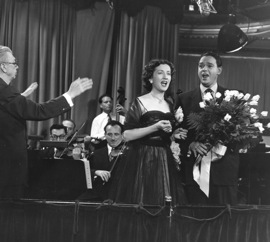 San Francisco Opera regular Dorothy Lorayne Warenskjold died on Dec. 27, in Kansas, at age 89. She was born in San Leandro, graduated from Mills College, and had a busy career with various opera houses, and also appeared on many NBC programs such as The Voice of Firestone.
San Francisco Opera regular Dorothy Lorayne Warenskjold died on Dec. 27, in Kansas, at age 89. She was born in San Leandro, graduated from Mills College, and had a busy career with various opera houses, and also appeared on many NBC programs such as The Voice of Firestone.
Her San Francisco career ranged from a 1948 Micaëla (in Carmen) and Nannetta (Falstaff) through several roles every year (five in 1954 alone) to Micaëla again and Sophie (Der Rosenkavalier) in 1955.
James Melton, who had several popular radio and TV music shows in the 1950s, met Warenskjold in San Francisco, and sent a message to his New York agent: "I¹ve discovered gold in California!" The soprano was involved with so many shows — all live in those days — so that she constantly flew coast to coast, taking the eight-hour transcontinental flights of those days.
The shows, one critic said, were "enhanced by lovely Dorothy Warenskjold, a welcome fugitive from the opera and concert circuits. Her duets with Melton are a high spot in every show."
Free Previews for Glass' Orphée
The first of Philip Glass' three operas based on films by Cocteau, the 1991 Orphée — first produced in 1993, and followed by La Belle et la bête, 1994, and Les Enfants Terribles, 1996 — will be produced by Nicole Paiement's Ensemble Parallèle, Feb. 26 and 27 at Herbst Theatre.
No need to wait that long: Free preview events will take place in the San Francisco Conservatory of Music, the de Young Museum, and Herbst Theatre soon. It's all part of the organization's community engagement, education, and outreach efforts.
At 6 p.m. on Jan. 18, a sneak preview will be given in the S.F. Conservatory Recital Hall, including talks by conductor and Artistic Director Paiement and stage director Brian Staufenbiel.
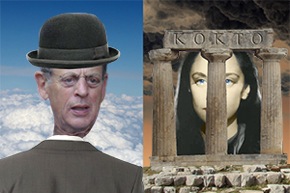
Cast members Susannah Biller (Eurydice), Eugene Brancoveanu (Orphée), John Duykers (Heurtebise), Thomas Glenn (Cégeste), and Brooke Muñoz (Aglaonice) will perform excerpts from the work, with accompaniment by pianist Paul Harris. A question-and-answer session and a reception will follow.
(Marnie Breckenridge, who sings the Princess, along with Phil Skinner as Poet/Judge and Austin Kness as Police/Commissaire, are not in the sneak preview.)
On Jan. 28, again beginning at 6 p.m., under the title of "Love, Obsession, and Death," two half-hour programs will form the de Young's "Friday Nights" offering in the Wilsey Court (which is part of the museum's admission-free area).
On Feb. 18, from 6 to 8 p.m., there is an open rehearsal in the Conservatory Salon, and on Feb. 25, the final dress rehearsal will take place, from 2 to 5 p.m. at Herbst Theatre.
For the accompanying illustration by SFCV’s writer Jeff Dunn, let the artist explain its meaning:
The woman is the Princess of Death (Maria Casares) in the Cocteau film based on the Greek myth, the screenplay of which is Glass' libretto. Note that the right half of the picture background is the inverse of the left half.The Doric columns are from a photo I took in Corinth, their base is from the Acropolis, the clouds from a shot I took from the air on the way to Newark, N.J. [Editor's note: New Jersey and Greek mythology?]
Glass is from a photo I took at the Cabrillo Festival. The other stuff is from the 'net. The surrealism of the film is consistent with the Magritte rendering of Glass "looking back" in the reverse suit.
Opera San José Plans a Grand Season
At age 85 and just three months after a serious car accident (from which she has almost completely recovered), Opera San José General Director Irene Dalis is planning a remarkable new season, the 28th for the company she founded.
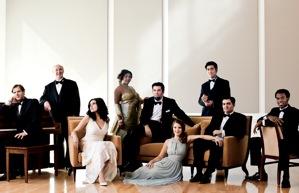
General Manager Larry Hancock is still acting general director, but Dalis had major responsibility for the selection and planning.
The San José native and member of opera's international pantheon is calling for a company premiere of Mozart's Idomeneo (to be conducted by Mozart specialist George Cleve), plus an unusual double-bill of Poulenc's La Voix humaine and Leoncavallo's Pagliacci, in addition to the more standard repertory of Verdi's La traviata and Gounod's Faust.
The 2011-2012 season features the principal artists from the San José resident company: Jasmina Halimic (soprano), Jouvanca Jean-Baptiste (soprano), Betany Coffland (mezzo-soprano), Alexander Boyer (tenor), Michael Dailey (tenor), Torlef Borsting (baritone), Krassen Karagiozov (baritone), Isaiah Musik-Ayala (bass-baritone), and Silas Elash (bass). Former residents soprano Rebecca Davis and tenor Christopher Bengochea return as guest artists.
Season subscriptions go on sale Feb. 7, starting as low as $100 for all four operas; single-ticket sales begin July 11. The season is made possible, in part, by a Cultural Affairs grant from the City of San José.
Idomeneo is scheduled for Sept. 10-25. The double bill, conducted by Bryan Nies (and featuring Betany Coffland in this chamber piece, which Magda Olivero sang in San Francisco, in 1979), is on Nov. 12-27.
David Rohrbough conducts both Traviata, Feb. 11-26, 2012, and Faust, April 21 – May 6.
Rattle's Pelléas
From an interview with Simon Rattle in the intermission of the Metropolitan Opera’s broadcast of Pelléas et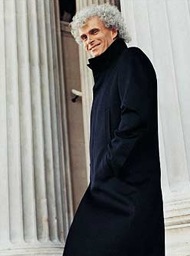 Mélisande:
Mélisande:
It's also a mosaic, it's not just an Impressionist painting, and all the little mosaic pieces must be in there to give it that dreamlike atmosphere, so it has to be tremendously precise to make it sound dreamlike.Unlike its reputation, a lot actually happens in the piece. It's one of the most violent operas, and one of the saddest.
Almost everything that is meant by the singers is actually spoken and sung in the orchestra. It's very funny when you look at the score: Almost every vocal line ends with three dots, as though they haven't quite said what they mean, and then the orchestra says what they mean.
[Pelléas] is the most addictive opera ... you get little bits of it in your brain which will not leave you. When you come to each new little phrase, it always seems like an old friend. [Debussy] never wastes any time.
I talked to the orchestra about making a sound like a Rothko painting — not only this beautiful shimmering surface, but something that comes absolutely from deep in the center of the earth.
Besides excitement and beauty, the music of Gustav Mahler is filled with angst and neuroticism. These dark spirits contribute to the music's unique value and appeal, but were hard on the composer himself. To deal with his tragedies and psychological problems, Mahler turned to a Vienna neighbor, the granddaddy of psychoanalysis.
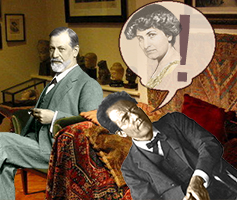
Mahler’s being treated by Sigmund Freud himself is both a historic fact and the subject of a new film, Mahler on the Couch. It is part of the Jan. 14-16 New German Cinema Festival at the Castro Theatre, a successor to years of "Berlin and Beyond," both headed by Ingrid Eggers.
A four-hour session in 1910 is just the fodder for this 2010 gripping account of Mahler's life by the father and son team Percy and Felix Adlon. There are brilliant performances by Johannes Silberschneider (as Mahler) and the mesmerizing newcomer Barbara Romaner as Mahler's genius, his unfaithful and much-married wife (Alma Maria Schindler Mahler, married later to [architect] Gropius and then later to [novelist] Werfel).
The film uses a film score entirely derived from Mahler's music, recorded by Esa-Pekka Salonen and the Swedish Radio Symphony Orchestra. Mahler opens the festival at 7 p.m., on Jan. 14.
Among the other films of the festival, of special interest is Celebration of Flight, a fascinating documentary about Daniel Rundström, who had served as a private pilot to sheiks and kings, such as Haille Selassie and the king of Yemen.
At the age of 78, Rundström dreams of building his own plane on an island in the Caribbean. He and a 16-year-old local boy move heaven and earth to develop, build, and ship their own aircraft for a designer air show in Florida. [2 p.m., Jan. 16]
Another film, Mountain Blood, deals with the William Tell story of the (real) Tyrolean revolt against Bavarian and French rule at the beginning of the 19th century. The heroine is the wife of a man who joins the fight led by Andreas Hofer, the historical figure heading the rebellion against Napoleon's overwhelming forces. The film was shot in location in spectacular South Tyrol. [6:30 p.m., Jan. 16]
Other festival films on Saturday are Keep Surfing, Intern for Life, The Architect, and She Deserved It. Also on the Sunday schedule: David Wants to Fly and Disenchantments.
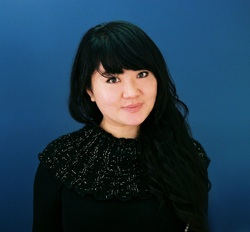
The manticore is a legendary mythical creature, similar to the Egyptian sphinx. With the body of a lion and head of a human, the manticore has three rows of sharp teeth. Says Du Yun: "He looks like a part of us and yet he is never one of us."
Du Yun, a Boosey and Hawkes Emerging Composer, is the author of Mantichora, a work for strings, which the Berkeley Symphony will premiere at its next concert, on Jan. 20.
Music Director Joana Carneiro will conduct the concert, which also includes Messiaen's Oiseaux exotiques (Exotic birds), with pianist Natasha Paremski, and Beethoven's Symphony No. 6 in F Major ("Pastoral").
Du Yun will have a second world premiere later this season: An Angel's Bones, to be performed in Philadelphia by the International Contemporary Ensemble, of which Du Yun is a founding member.
Born and raised in Shanghai, Du Yun is a resident of New York City and serves on the composition faculty at the State University of New York–Purchase.
Before getting all riled up over Anthony Tommasini's Sunday and Monday New York Times columns about classical music's "top ten," and you start reading all the appended comments, prompted by both his (deliberately?) controversial statements and his request for responses, take a look at SFCV writers Lisa Hirsch's and Jeff Dunn's meditations on the subject. Who says classical music is not a blood sport?
